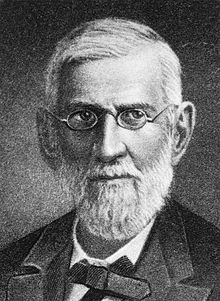Alexandre Mouton
| Alexandre Mouton | |
|---|---|
 |
|
| 11th Governor of Louisiana | |
|
In office January 30, 1843 – February 12, 1846 |
|
| Preceded by | Andre B. Roman |
| Succeeded by | Isaac Johnson |
|
United States Senator from Louisiana |
|
|
In office January 12, 1837 – March 1, 1842 |
|
| Preceded by | Alexander Porter |
| Succeeded by | Charles M. Conrad |
| Member of the Louisiana House of Representatives | |
|
In office 1827–1832 |
|
| Personal details | |
| Born | November 19, 1804 Lafayette Parish, Louisiana |
| Died | February 12, 1885 (aged 80) near Lafayette, Louisiana |
| Political party | Democratic |
| Spouse(s) | (1) Zelia Rousseau (2) Emma Kitchell Gardner |
| Alma mater | Georgetown University |
| Religion | Catholic |
Alexandre Mouton (November 19, 1804 – February 12, 1885) was a United States Senator and the 11th Governor of Louisiana.
He was born in Attakapas district (now Lafayette Parish) into a wealthy plantation owning Cajun family. He pursued classical studies and graduated from Georgetown College. He studied law, was admitted to the bar in 1825, and commenced practice in Lafayette Parish. He married Zelia Rousseau, the granddaughter of Governor Jacques Dupré, and they had 13 children before her death. In 1829, he married Emma Kitchell Gardner; this marriage had six children.
From 1827 to 1832 was a member of the Louisiana House of Representatives, serving as speaker in 1831 - 1832. He was a presidential elector on the Democratic ticket in 1828, 1832, and 1836, and was an unsuccessful candidate for election in 1830 to the Twenty-second Congress. In 1836 he was again a member of the State house of representatives.
Mouton was elected as a Democrat to the U.S. Senate to fill the vacancy caused by the resignation of Alexander Porter, was reelected to the full term, and served from January 12, 1837, until his resignation on March 1, 1842. While in the Senate he was chairman of the Committee on Agriculture (Twenty-sixth Congress).
From 1843 to 1846, Mouton was Governor of Louisiana. As governor, Mouton reduced expenditures and liquidated state assets to balance the budget and meet bond obligations without raising taxes. He sold state-owned steamboats, equipment and slaves used to remove the Red River Raft in 1834 under Governor Roman. As governor he opposed all expenditures for internal improvements. He leased out state penitentiary labor and equipment. He supported the call for a constitutional convention, removal of property qualifications for suffrage and office holding and the election of all local officials and most judges.
...
Wikipedia
